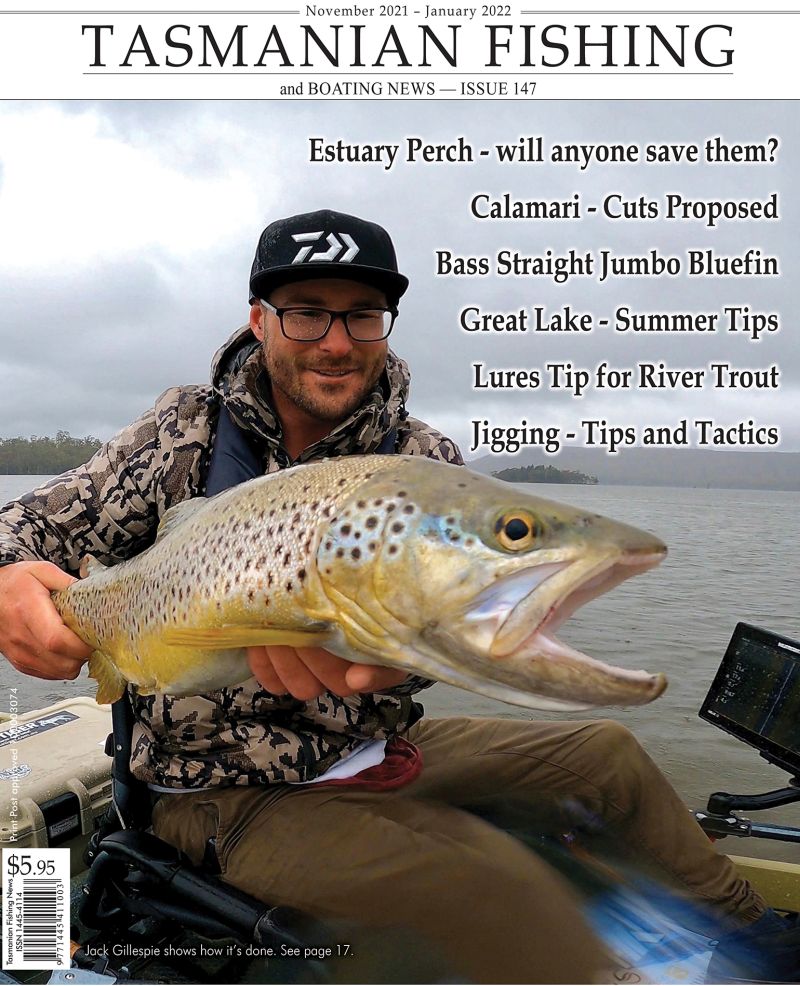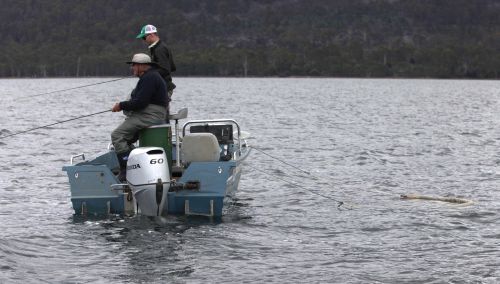Tidal Talk August 2001
August is birthday month at my place. My wife Helen and two of our three children all raise the same question at the same time - what to get them as gifts. A new fly rod for Helen? a nice reel for Sam? and a new fly line for Winston? Now that's got possibilities! Might also result in more time to go fishing - alone.Speaking of birthdays, the 17th of June marked the eighth year for the recreational fishing management section in the government's Fisheries unit.
That was when Greg Double and I started working together to help manage and improve the recreational fishery. So...in eight years, what have we achieved apart from the "odd grey hair" becoming the odd black one?
Well certainly, there have been a lot of management changes for both the commercial and the recreational sector. The D'entrecastreaux Channel, The Derwent River and the Huon River and Georges Bay have been set aside mainly for recreational fishing. We now have a new licensing system including nets so we can monitor participation in these fisheries.
Management controls have also been introduced to make netting more responsible. About 46 areas have been set aside as no-netting areas to protect sensitive habitat and provide refuge for some species. There are now controls on soak times for nets and limits on the amount of net allowed per boat. Other changes include new size limits for some species and some bag limits. I expect some more changes as a result of the proposals for 2001. These activities are aimed at sustaining the fishery and making sure we have fish for the future. It's also about a fair go for all groups.
Management is only a small part of looking after a recreational fishery. It's all very well to have rules but people need to know about them and to believe in them so they do the right thing.
A code of practise on fishing for the future, improved leaflets on recreational fishing including maps, plastic rulers and stick-on rulers have made an impact. We also scrounged the old Landcare bus and started doing shows and major events.
In 1995, a major landmark was getting the Licensing Trust Fund going. It has provided funding for projects and programs to improve the recreational fishery.
In 1996 we encouraged the Commonwealth to introduce the Fishcare Program which grew into the Fisheries Action Program under the Natural Heritage Trust. That's when Avril Brown, the Fishcare co-ordinator, joined us. It's worth noting that more than one and one half million dollars has been provided by the Natural Heritage Trust to fund fisheries-related projects since 1997, and that has been matched by State contributions.
The Natural Heritage Trust has helped the recreational fishery unit to enhance its education and awareness activity including the establishment of the Fishcare Volunteers (we now have 50 of them working around the State). Volunteers are great people who really care about the future. They talk to people fishing; they have been trained to go into schools; they tend displays, assist with take-a-kid fishing days and with research.
The Natural Heritage Trust also funded the purchase and operation of display vans. As well, a major communications project has commenced with the aim of promoting more responsible fishing practises. Allison Mitchell has joined our team to help with this project. Incidentally, the magnetic fishing pool, which we've taken to events around the State, has been a great hit and has done great service in helping to promote the idea of putting the little ones back..
All of this effort is part of a deliberate push to communicate and consult. Since 1994 there have been four separate rounds of State-wide meetings talking about change, and displays have been mounted at more than 100 events attended by more than one million people. Media releases, TV, and talkback radio have all been used to help let people know what's going on. We also helped to set up the peak recreational fishery body.
Eight years ago, back in 1993, we knew very little about recreational fishing. We found some money to pay Dr Jeremy Lyle to do a small survey on the rock lobster fishery. This captured his interest and he has now completed a number of surveys on the licensed recreational fishery. With help from licence revenue, the Natural Heritage Trust and the Fishing Industry Research and Development Corporation, the information-gathering element of a major survey of the whole fishery has just been completed and we are looking forward to the results.
Two thirds of the money to fund our little unit of six people comes from the Licensing Trust Fund and the Natural Heritage Trust. The challenge we face now is how to keep the program going as the Natural Heritage Trust money cuts out.
I think it was 1995 when we started using the brand "Fish for the future."
Fundamentally, that's the bottom line to everything we do and I really do hope that all our activity has helped with what I see as a trend to more responsible fishing. Thanks to all of you who have helped.
For our next birthday, I'm planning a party - which brings me back to me family celebrations.
My mother used to say "self praise is no recommendation" but I always reckon it's a whole lot better than nothing at all.
If you have got this far, thanks for your attention and remember: fish for the future.
John Smith



